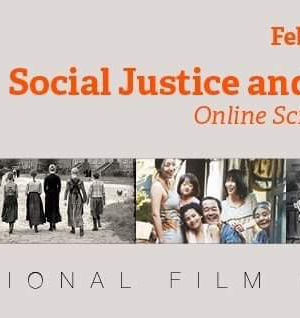Written by Charissa Roberson
On Feb. 17, Roanoke College kicked off its third annual International Film Festival. Despite changes and challenges due to COVID-19, the two-week long festival continued to draw enthusiastic participation from faculty, students and community members alike.
This year’s theme was “Social Justice and the Oscars.” Films selected for the festival met two criteria: (1) they had been nominated for (or won) an Academy Award and (2) they explored important themes related to social justice. “It is a great time to discuss social justice issues considering the crazy past year we’ve had,” said senior Liesl Greider, who was the assistant for the RCIFF this year. “[W]e’re glad that we could contribute meaningful dialogue through the lens of film.”
As in previous years, the 2021 RCIFF showcased a wide variety of subjects, languages and time periods. This year’s films ranged from black-and-white Italian film “Bicycle Thieves” (1948) to 2020’s Best Picture Oscar winner, Korean dark comedy-thriller “Parasite” (2019) – a fan-favorite during the 2021 festival.
A trademark of the RCIFF has been the communal gatherings that surround each film screening, with discussion and refreshments afterwards. Not being able to meet in-person this year was a major challenge to overcome. However, the organizers of the RCIFF were able to recreate the shared experience of watching a film together even while being virtual.
At each film screening for the 2021 RCIFF, audience members met via Zoom, received a link to watch the film simultaneously and then reconvened for a panel-led discussion. Not only did this allow people to still watch and discuss the films as a group, but holding the RCIFF online even presented some benefits.
“In past years we had issues with snowstorms and the like preventing people from making it out to screenings,” Greider said. “But this year, we were able to screen ‘Léviathan’ on a snow day, still getting a great turnout of people!”
Since its inception three years ago, the RCIFF has expanded its reach across campus and drawn supporters from even more diverse disciplines. Greider said that she hopes the film festival will continue to grow in future years, allowing more people to discover international film and opening up opportunities to experience different cultures and perspectives.
“Film has a special way of evoking these interdisciplinary conversations, which we need these days more than ever before,” she said.




